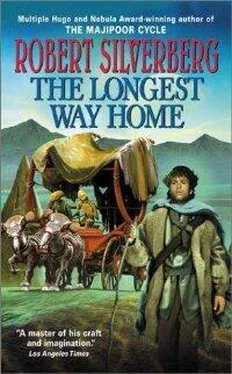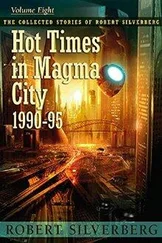The patient did not seem to complain as Joseph ventured into the golden interior tissues. He wondered how deeply he dared to go; but the essential thing was to seem confident and composed, and that was surprisingly easy for him to achieve. Perhaps in these weeks among the Indigenes he had begun to acquire some form of their overriding indifference to the trivial realities of the visible world. Under the pressure of his blade blood had begun freely to flow, scarlet blood with emerald highlights. The blood is only an illusion, Joseph told himself. The knife I use is an illusion also. Whatever pain the patient may be feeling is illusory. The weapon-point that I’m seeking is another illusion.
His hand was steady. His conscience remained clear.
He touched something hard within. Was it the point, or was it a bone? He wiggled the knifeblade and thought he felt motion against its tip. A bone would not move, he thought. It must be the weapon-point. Coolly he widened the opening. A hint of something dark inside there, was it? He washed away the blood and took a close look. The point, yes. Deep in the meat of the Indigene’s back.
Now came the hard part, for him, for his patient. He beckoned to two of the Indigene onlookers.
“Hold him down,” Joseph said, using the grammatical mode of a direct command, not a supplication. He was the most important person in this room, right now. He did not need to beg for the assistance that was required. “You, put your hand here, and you, hold him over here. Don’t let him move.”
There was no kindly way to do this. He inserted the blade, listened for the little scraping sound as it made contact with the hidden point within, made a twisting motion with his wrist, brought the tip of the blade upward, involuntarily biting his lip as he did so. A great shudder went through the Indigene, who lay face down on the pile of rugs before him. The two villagers who were holding him did not waver.
“There it is,” Joseph said, as the head of the point came into view.
He eased it farther upward, bringing it out of the Indigene’s flesh with one smooth motion, and caught it for a moment in his hand, showing it around exultantly to his audience. Then he tossed it aside. Blood was flowing more heavily now than before. Covering the wound with his hand, he watched quizzically as it welled up between his fingers. He stanched, laved, stanched again. The flow began to slacken. Was it safe to close the incision at this point? He held the sides of the wound together, contemplated them, nodded thoughtfully, just as someone who really knew what he was doing might do.
“Hand that to me,” Joseph said, indicating the little machine from his utility case that served to stitch wounds. He was still not entirely certain how to operate it, but he had enough of a rough idea to make the attempt worthwhile.
Three stitches seemed to do the job.
He prescribed rest for the patient, and the pain-killing drug, and then, an inspired thought, some wine also. The Indigenes were passing the extracted weapon-point from hand to hand around the room. They were staring at him with what certainly must be looks of awe. Joseph wondered, as he had before, whether this time he might not have played the role too well; he wanted these people to move him along to the next village along his route south, after all, not lay claim to him as a permanent village treasure. But once again he had misjudged the way their minds worked. They kept him only until he had had the opportunity to examine every sick person in the village; and then, two or three weeks later, when he had set things to rights as much as possible, they let him know that the time had come for him to be sent onward.
He was not going to miss this place. Joseph had made a point of introducing himself by name to the chief minister and the herbalist and several others, but they had absorbed the information with no evident show of interest, and during his entire stay in the village no one had ever called him by name. He had no relationship there similar to the one he had had with the Ardardin, or even with Ulvas. It was strangely depersonalizing. He felt as though he had no existence for these people other than as a pair of skilled hands. But he saw a reason for that: he had come to the first village as a refugee, and they had taken him in the way they would take in a guest. But here he had been purchased. He was considered mere property. At best a slave, perhaps.
The route to the next village took Joseph through a district of abandoned farms. There were no indications of any Great House in the vicinity; this seemed to be one of the regions, common also in Helikis, where the Masters were absentee landlords and the farms were operated in their name by bailiffs who were themselves of Folkish blood. But the Folk who farmed here must have been loyalists, for the destruction that had been worked was complete, the rebels striking against their own kind with the vindictiveness and vehemence that elsewhere they had reserved for the Masters. Joseph saw the same sort of ruination he had looked upon at Ludbrek House, a sorry wasteland of burned houses, wrecked carts, dead animals, drowned fields. Seven such farms lay along one fifteen-mile stretch of road, all of them shattered in the same fashion. There was no sign of life anywhere.
It rained for the first time that season on the day they passed the last of the dead farms. The three Indigenes who were transporting him took no notice whatever as it started. They said nothing, they made no attempt to cover themselves. But Joseph, riding unprotected in the back of the open wagon, was caught by surprise when the sky, which had been an iron gray for days, turned black and then silver and abruptly began pelting him with cold, hard, fierce rain. He was drenched almost before he knew what was happening. He managed to improvise a little shelter for himself out of some of the many fur mats that were lying about in the wagon and a few of the sticks that were there also, but it was a flimsy construction that did very little to keep the rain out, and he was soaked already anyway.
There was no letup in the rain all day, or on the one that followed. Joseph knew that rain in the eastern half of the northern continent was a highly seasonal thing, a dry season followed by a wet one, with the annual rains beginning in the south and working their way north to High Manza, but he had imagined the change from one to the other would be more gradual. This was like the tipping of a bucket over lands that had been parched for months, a vast bucket whose contents were infinite, inexhaustible. He had never felt so cold and wet in his life. He had not known that such discomfort was possible.
At first the rain disappeared into the ground as soon as it struck. But by the second day the land, which in these parts was coarse sandy gray stuff that had looked as if it had not felt rain for centuries, had been saturated by the downpour, was glutted by it, ceasing now to absorb it. Freshets and rivulets were beginning to make their way along the old dry watercourses that ran in multitudinous furrows across the sloping plains. Already little ponds were forming. Another few days of this, Joseph thought, and there would be lakes and rivers.
He wondered how the mud-and-wattle buildings that the Indigenes of this territory favored could stand up to such an onslaught. Rainfall like this ought to send them sluicing away. But they were hardly likely to build with such stuff if it came apart under the impact of the first rain, and indeed the village toward which they had been traveling, another one of conical towers crowded tightly together around a central plaza, was sloughing off the watery bombardment as easily as though its buildings were made of steel and concrete. They must add something to the mud to make it water-resistant, Joseph thought. The juice of one of their herbs, maybe. The entire science of these people appeared to be constructed out of a knowledge of the chemical properties of the plant life that grew about them. They had no physics, no astronomy, no technology, no real medicine other than the use of potions. But they could build houses out of twigs and mud that would stay intact in diabolical rainfall like this.
Читать дальше












